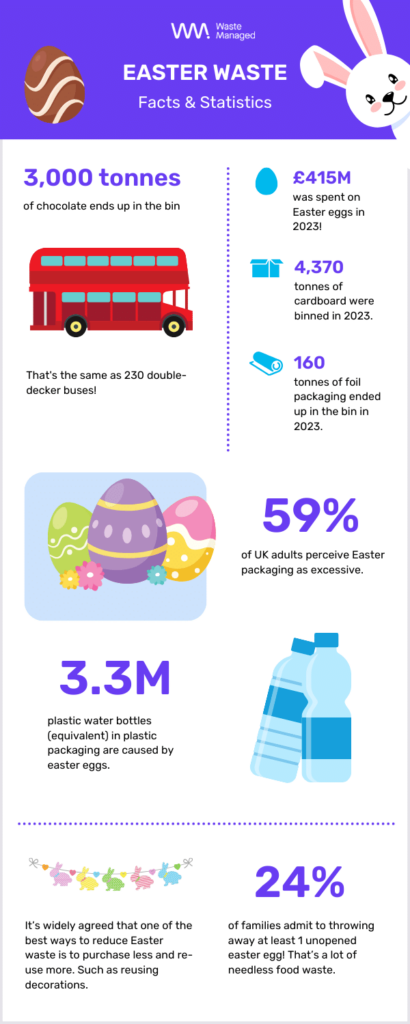
As Easter approaches many of us will be indulging in chocolate treats and participating in egg hunts. However, amidst the celebrations, there’s a negative element to the weekend —Easter waste.
Shocking statistics reveal that Brits spent a whopping £415 million on Easter eggs in 2023 alone, with a staggering 3,000 tonnes of chocolate ending up in the bin, equivalent to 230 double-decker buses.
This Egg-ordinary waste paints a concerning picture of our environmental impact during this time.
With the help of our Sustainability Expert, we’re uncovering the hidden impact of Easter waste and exploring actionable steps to mitigate its effects on our planet.

The Bitter Taste of Easter Waste
While Easter is synonymous with joy and celebration, it’s also associated with excessive packaging and food waste. Last year’s Easter egg frenzy resulted in 4,370 tonnes of cardboard and 160 tonnes of foil packaging being binned, contributing significantly to packaging waste.
Despite growing awareness of sustainability issues, a staggering 59% of UK adults still perceive Easter packaging as excessive.
Moreover, the environmental toll extends beyond packaging. Astonishingly, the UK consumes the equivalent of 3.3 million plastic water bottles in plastic packaging for Easter eggs annually, exacerbating the pollution crisis.
Additionally, nearly a quarter of households admit to discarding uneaten Easter eggs, deepening the issue of food waste.

Time for change
Steve Traviss, our Sustainability Expert, emphasises the urgency of adopting sustainable practices during Easter festivities. “As we celebrate Easter, we must remain mindful of our environmental footprint,” says Traviss.
“By prioritising sustainability and embracing responsible consumer behaviour, we can mitigate the significant waste generated during this period.”
Tips for a Greener Easter
- Choose Minimal Packaging: Opt for Easter eggs and treats with minimal packaging or those made from recyclable or biodegradable materials. By selecting products with eco-friendly packaging, you can significantly reduce waste.
- Reuse and Recycle: Encourage the reuse and recycling of Easter egg packaging and other materials. After enjoying your treats, ensure that cardboard, foil, or plastic packaging is recycled appropriately. By giving these materials a second life, you contribute to a circular economy and reduce landfill waste.
- Reduce Purchasing: Be mindful of your Easter egg purchases and aim to buy only what you need. By avoiding excessive buying, you not only minimise waste but also save money.
- Donation: If you find yourself with surplus Easter treats, consider donating them to a local food bank. This ensures that food doesn’t go to waste and benefits those in need within your community.

As we eagerly anticipate the arrival of Easter, let’s remember the importance of celebrating sustainably.
By making conscious choices, such as opting for minimal packaging, recycling diligently, and donating excess treats, we can make a positive impact on the environment.
This Easter let’s crack down on waste and indulge in a greener celebration to, ensure that future generations can continue to enjoy the festivities without compromising the planet.
About the Author

Steve Traviss
Procurement & Sustainability Officer
Steve Traviss is MCIPS Chartered and is extremely passionate about the environment and corporate responsibility when it comes to sustainable waste disposal practices. Steve truly embodies everything we stand for at Waste Managed and in 2022, Steve took part in a world record scuba beach clean up in Thailand which we’re incredibly proud of him for. Steve researches and writes a lot of our blog content on our website and draws off of a wealth of experience in the waste management industry and knowledge of UK environmental legislation.








